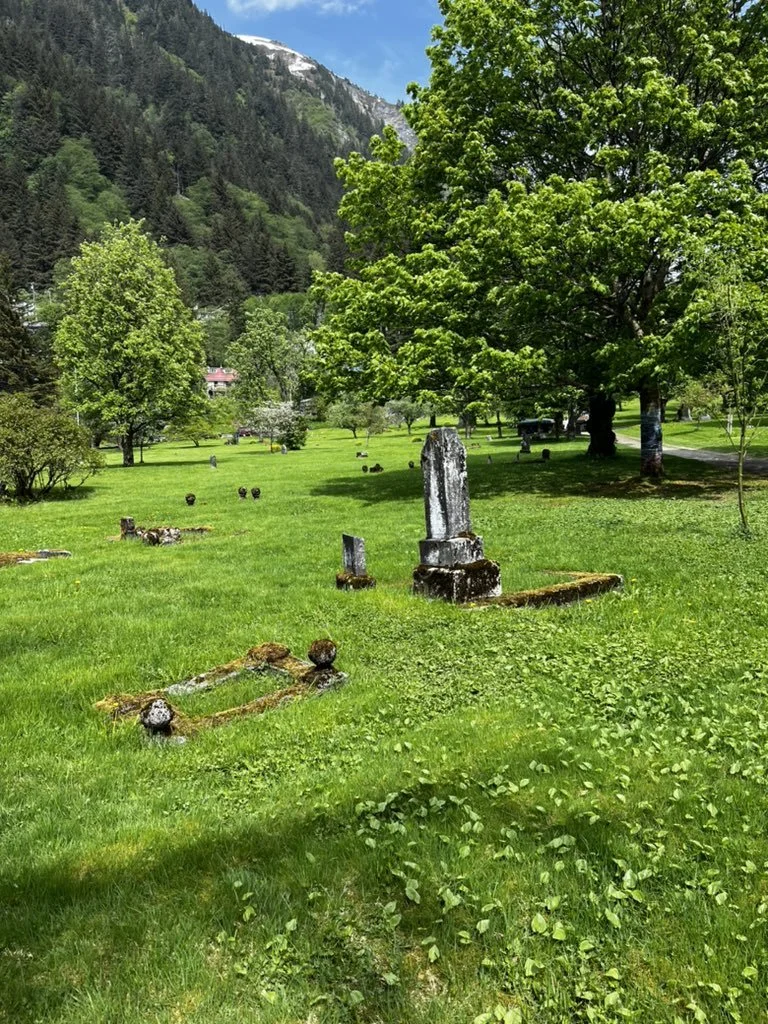You’d Never Know
Sometimes a photo does not - or cannot - tell the whole story.
Looking at this gorgeous scenery, you might think my resting place is idyllic. Far from it. I mean, okay, fine, it really isn’t that bad. The mountains are gorgeous, especially on this sunny summer day. The temperature rarely goes into sweltering territory like it did in my youth when I lived across the country in the South. But up here in Alaska, even I can admit that I enjoy the open spaces and (mostly) fresh air.
My family was part of the homesteading project to build up Alaska after it became a state. I was young when we moved across country from Alabama. Back home, my parents owned a farm where we raised cattle for slaughter and milk. It was a simple yet hard life. Our fortune rested on the weather, which was often fickle at best, stubborn at worst. When I heard we were packing up for a new adventure, I hoped we were choosing an actual simple life. I could not have been more wrong.
There was a reason the government wanted people to move to Alaska to populate the new state. It was a wasteland, but that was never mentioned. It was propositioned to us as a wide open space of opportunity rather than sweeping despair. But like my family always did, we made it work. I think that is why I resented the place at first because we had to start from nothing. Again. I wanted a life to kick back and enjoy not one where we kept scraping by.
If I thought relying on Mother Nature in the South was a bear, I hadn’t yet met the actual bears and moose and other wildlife that called this land their home. I hadn’t known what permafrost or frozen ground was. I did not understand the ways of blizzards and sub-zero temperatures. I didn’t know anything could be worse than a sweltering summer day. Yet we managed to find it.
Yet we stayed. Even I couldn’t escape the allure of the mountains. The streams. The fishing. The hiking. I had a chance to commune with the land. It was fleeting, though, as harsh temperatures moved in quickly. We had to make sure we could survive, that other homesteading families could thrive. It was a brutal cycle that never ended. I wanted nothing more than to escape.
I assumed the stores and increased population would offer me a reprieve. I thought it would be a chance to escape our land into civilization. Little did I know that progress meant our land being taken over, sometimes destroyed. Strip malls. Seedy bars. Stores that claimed to sell groceries but really peddled expensive tin cans. They all popped up and ruined my landscapes that I had no idea I came to love.
That is why I told you a picture only tells part of the story. You see, if the camera pointed away from my grave marker and toward the street, you would see a busy school nearby. Cars come for pickup and drop off, idling outside and spreading pollution. Not to mention screaming children cutting through the cemetery on their walks home. I don’t quite mind that part, if only they’d stop to look who is buried here. If only someone realized my family was part of who built this state.
They say a picture is worth a thousand words, but in this case it’s worth nothing if we do not dig deeper. I tried not to lament progress, but here I am still harboring dread. I try to focus on the mountains ahead of me. I try to see their snowcapped beauty as a reminder of simpler times. But yet I cannot escape the feeling that my story will be scooped up and swept away as more stores, more people, more progress looms.
While I cannot control what happens, I can focus on the positives. I get to see this stunning site. I get to feel the breeze. I get to remember how I helped build this state with my hands. Our blood, sweat, and tears are mixed with the land. So, no. A photo cannot tell the whole story.
But it can sure reflect ourselves back to us.
